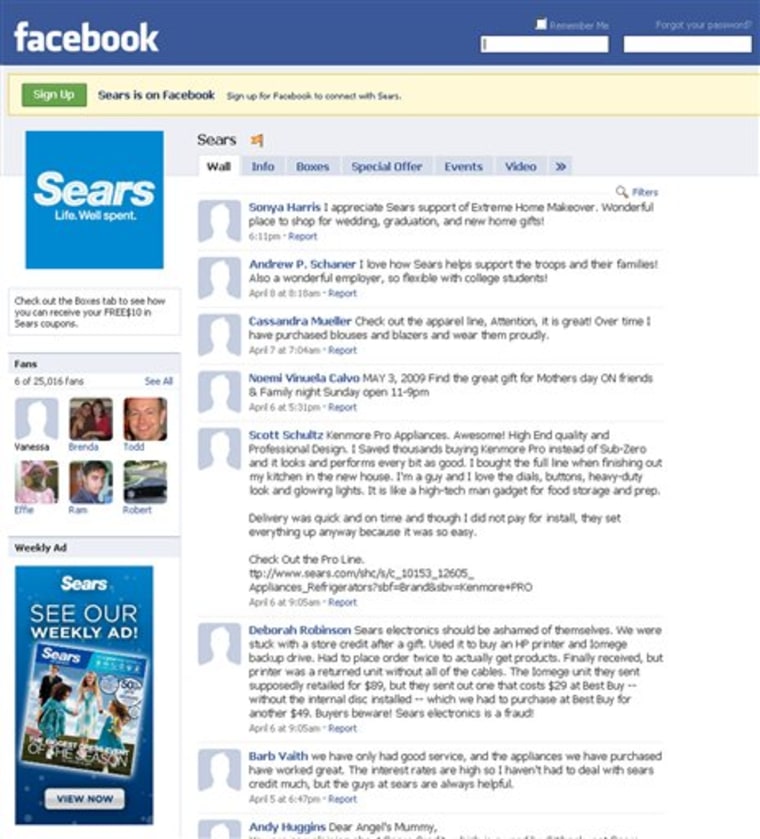Could a $10 coupon code buy your friendship?
It's a proposition worth considering as more retailers dangle exclusive discounts and perks on social networking sites such as Facebook and Twitter, where people stay connected by posting frequent updates about what they're doing.
You can also get the first word on special promotions, help resolving customer service disputes, or even friendly checkups on how you're doing.
In one recent Twitter post, Kmart asks about a poster's recent shopping trip, "which (store) did you go to? let me know about your trip!"
Not every company is involved in social networking and many are still figuring out how to best use the sites, but there's no doubt more are getting into the act.
Out of 100 major retailers, 59 had Facebook accounts in September 2008. That was almost double the number just four months earlier, according to Rosetta, a market research firm based in Princeton, N.J.
Here's how you can get the most savings and customer service from Facebook and Twitter.
Savings
The discounts on Facebook and Twitter often mimic those sent in e-mail newsletters. But companies also offer exclusive deals on the sites.
Sears, for instance, sometimes gives $10 coupons to people who become fans on Facebook. Dell posts discount codes for online purchases on Twitter. Shoe retailer Zappos.com periodically gives passes for free overnight shipping through both Facebook and Twitter.
Some companies also use giveaways on the sites to generate a buzz. This winter, Burger King created a minor stir when it offered free Whopper coupons to anyone who deleted 10 friends from Facebook.
Rather than troll for any discounts you can find, check to see if your favorite products have pages. Keeping up with a few brands you love might be a better strategy, since you never know when companies will offer coupons and deals.
The frequent updates on Facebook and Twitter can also be useful in jumping on limited-time offers.
That might be useful with sites such as DealNews.com, where about a third of listed sales expire within 24 hours, said Dan de Grandpre, the site's chief executive.
Even if a promotion lasts several days, quick action might mean snagging the size, color or model you want.
Companies generally know better than to deluge fans with updates, too.
Coupons.com, for instance, only updates its Twitter account every two to four hours, said Steven Boal, the site's founder and chief executive.
"We wanted to be very careful. You don't want to inundate people with information," he said.
To help avoid that problem, DealNews.com plans to segment its feed into categories such as women's clothing and electronics within the next few weeks. The idea is to tailor updates to individual interests.
But before you sign up to follow a company, be sure you know whether it's run by a fan or the company. It's usually fairly easy to tell if a page is maintained by the brand, and Facebook says it takes down unofficial pages if the company requests.
Customer service
Posting questions and concerns on a public forum such as Facebook or Twitter can provoke a speedy response for obvious reasons.
"You might get a lot more success than waiting on a phone call or in line for a help desk," said Adam Cohen, a partner with Rosetta's consumer goods and retail practice.
Users are often surprised by how quickly they get responses from Kmart and Sears to posts on the sites, said spokesman Tom Aiello That applies to even minor questions, not just complaints.
When one Twitterer recently wondered why there was no layaway at Kmart's New York City store, the company's posted this reply:
"hmmm. I'll (at) you when I connect with the layaway team."
In Twitter speak, (at) is shorthand for directing a response to a particular user.
Not every company monitors the Web for complaints, but they're generally getting more savvy as shoppers increasingly head online to air concerns, said Rosetta's Cohen.
Some companies have entire staffs devoted to policing their online reputations.
In 2007, cable provider Comcast formed a team to scour Web postings for complaints. The team reaches out to commenters by matching clues in postings to the company's database of customer phone numbers and e-mails. Otherwise, Comcast reps may post a reply to the complaint online.
Facebook and Twitter can also be used to get answers to a broader range of questions. The team that manages Dell's Twitter account, for instance, fields questions on topics including environmental initiatives, new products and charitable programs.
"It runs the gamut. (Twitter) opens up more of a dialogue than the traditional customer service line," said Richard Binhammer, a Dell spokesman.
Lifestyle
Just as with a favorite TV show or sports team, you might choose to follow a company simply because you love the brand.
Madewell, the clothing chain owned by J.Crew, uses Facebook to keep shoppers informed of in-store parties and events such as "Denim After Dark." The idea is make people feel they're a part of the brand.
"It's where people get the first word on what we're doing," said Gigi Guerra, head of marketing at Madewell.
Of course, public Facebook or Twitter pages vary in sophistication. Some companies create pages that remain static for weeks at a time. Others use the sites to engage shoppers in discussions and keep them connected to the brand.
"People don't go to these sites to shop, they go to interact," Cohen said. "So if all (the company is) doing is broadcasting specials, it's not going to work."
